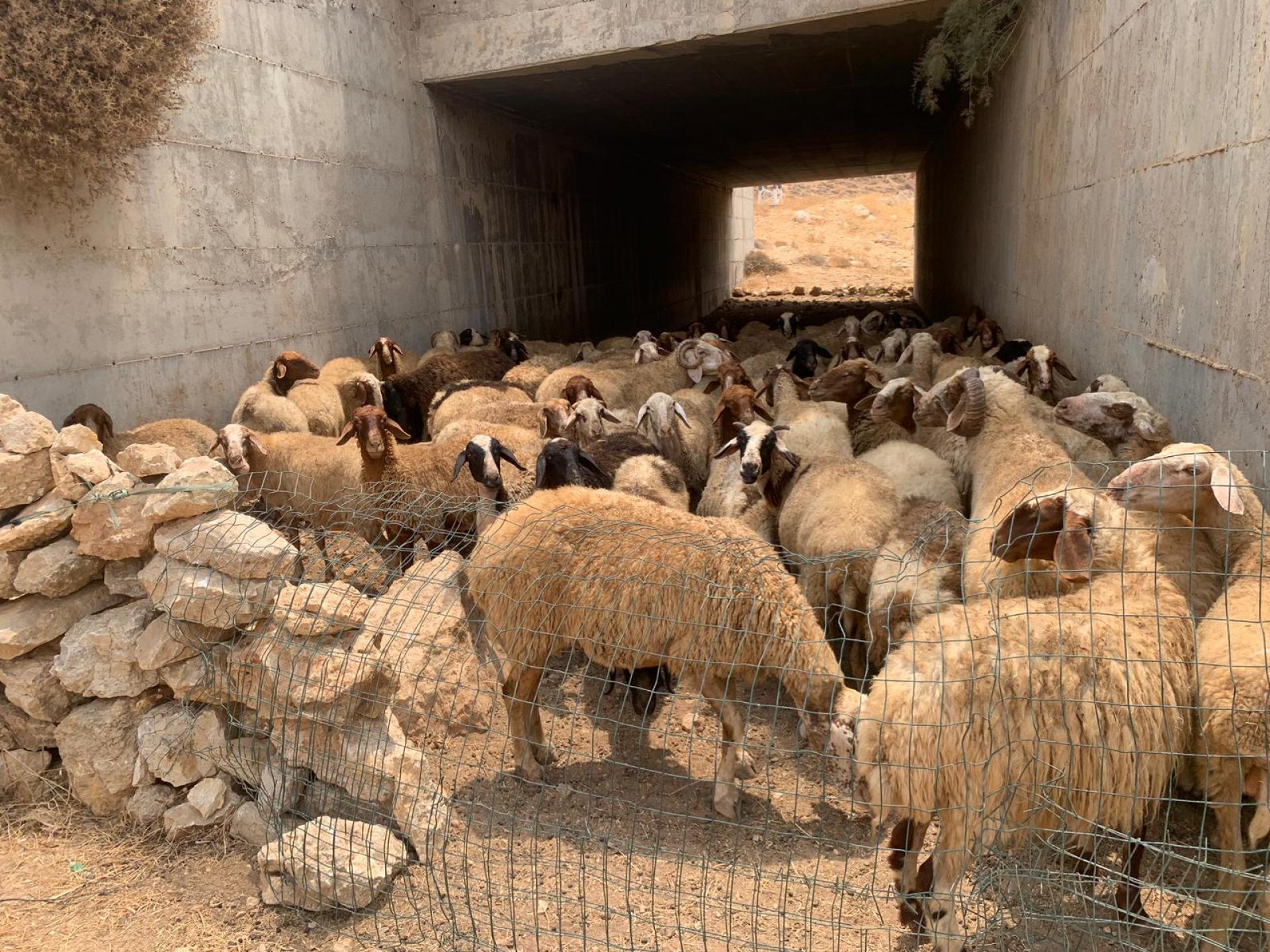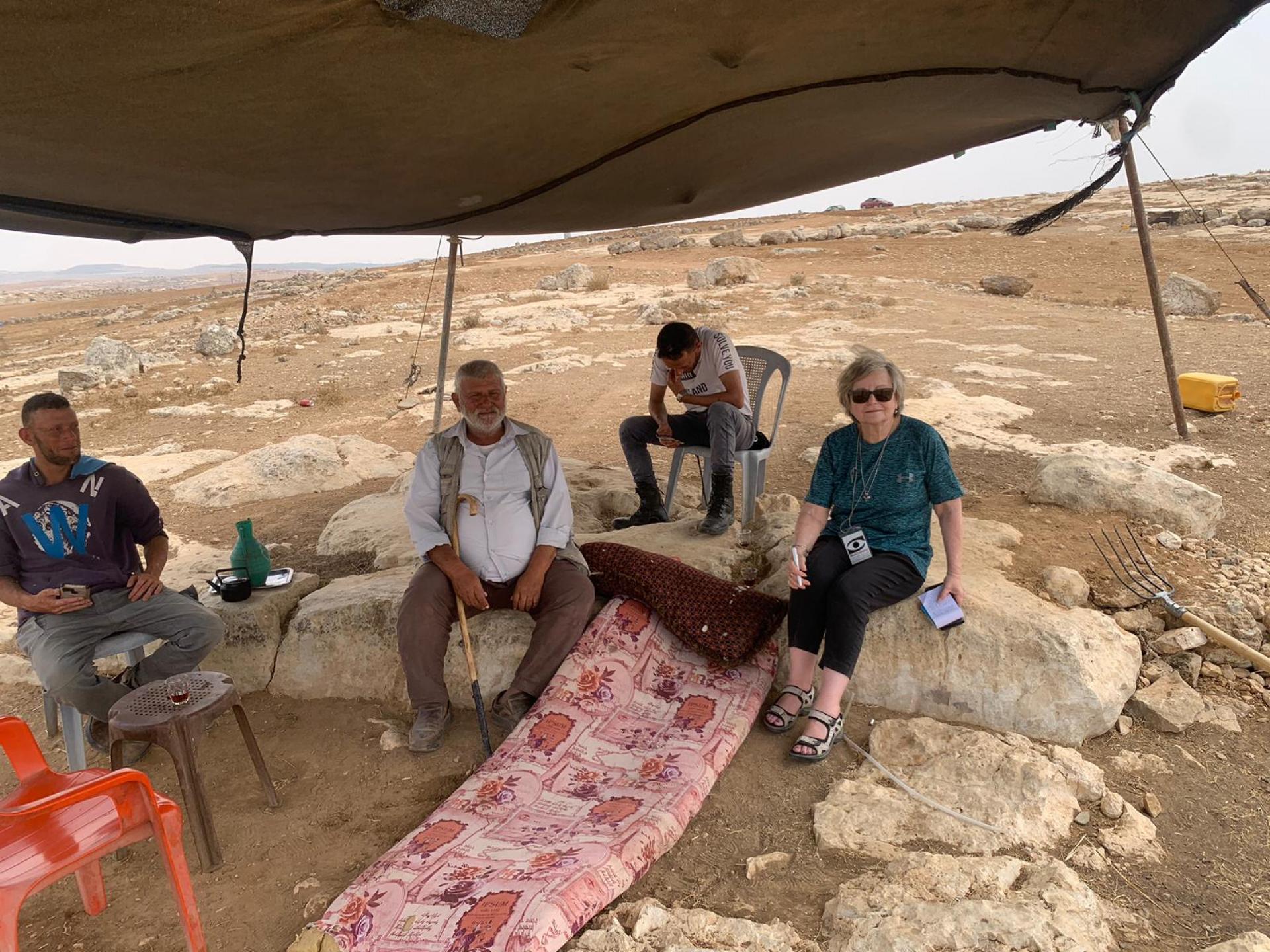Maktal Umm-Salem - settlers throw sheep carcasses under the bridge
South Mount Hebron 14.8.2023
Smadar (reporting) and Muhammad. Editor: Mira Balaban; Translator: Natanya
The purpose of the shift was a visit to Khalet a-Daba’, south of At-Tuwani. But reality dictated otherwise.
From road 60 we turned to road 317, in the direction of Asael and Susiya.
Immediately after the intersection, in a small area called Maktal Umm-Salem, on the side of Samu’ from the north, Amer's family lives. We went to meet them, to Umm Yasser, his wife, and to bring clothes and games. The kids were happy, and so were we. We asked about Saleh who was chased away by harassment and abandoned Lower Wadada (on the other side of road 317). She points to the hills in the direction of Samu’. She doesn't know exactly where. We asked about the settlers. She says that they throw sheep carcasses under the bridge of Highway 317. Reminds me of the case of Abu Safi, that Israel Kaplan, from the Mikneh Yehuda farm near Asael, threw a sheep carcass at the entrance of his compound.
We drove to the crossing under the bridge on road 317. This is Wadi Radim, over which the bridge passes. And indeed, the sight is chilling. The smell too. Old carcasses and next to them fresh carcasses. One of them is a lamb from that day. Amer (from Maktal Umm Salem) sits on a hill, while his flock huddles in separate pens for goats and sheep, in the shade under the bridge. He says that at noon because of the heat, they are under the bridge. In the evening he will take them to the area where they live. Moving away from there in no way occurs to him. With all the suffering, this is his and his family's place.
The pictures we took and the video that Muhammad took speak for themselves. The smell cannot be transferred!
We called Ziad from Upper Wadada to find out what was going on with them. The eldest son Yusuf answers, and says that like every year, they moved to the place next to the tall pillbox at the intersection of Shani-Livne.
On our way to visit Ziad from Wadada, we saw in front of the second intersection, near the pillbox on the left (north), near the pile of white lime, a cluster of tents that we had not seen before. We decided to check. There is no paved road of any kind, but Muhammad does not give up and drives on the rocks[N1] (there is a jeep). We were seen by some young men who looked frightened (they thought it was a settler vehicle). Muhammad shouted words of peace and they calmed down. They preferred to call the father of the family, Ahmad Abu Awwad. He told us about the family, which numbered about thirty people. The place is called Khalet al-Nias. Eight years ago they had to move to the current place, because in their previous place of residence, after Asael, they suffered harassment from settlers, who made their lives unbearable. But here too, as in other areas in Masafer Yetta, settlers with their herds come onto their pastures, and therefore they are forced to buy feed for the flock with a lot of money.
In previous years, the situation was better: when they reported to the police, they received assistance and the settlers were expelled (before their herds wiped out all the grass). This year they filed complaints with the Kiryat Arba police, but there was no response: the police did not even come to the scene. We contacted Yesh Din, hoping (faintly) to help on the issue. At night they sleep on beds they built themselves, which are placed outside, in order to guard the 160 heads of sheep in their possession. Indeed, a broken sleep.
Ahmad adds that about ten days ago, a settler appeared in their territory (he doesn't know from where) and threatened to expel them from Khalet al Nias as well.
Another place where it's hard to breathe when you leave.
On the way back, we noticed three large piles of fertilizer intended for the vineyards of the settler Yinon, from Meiter Farm. He continues to fulfil his dream, to take over the entire area and probably to operate a winery.


